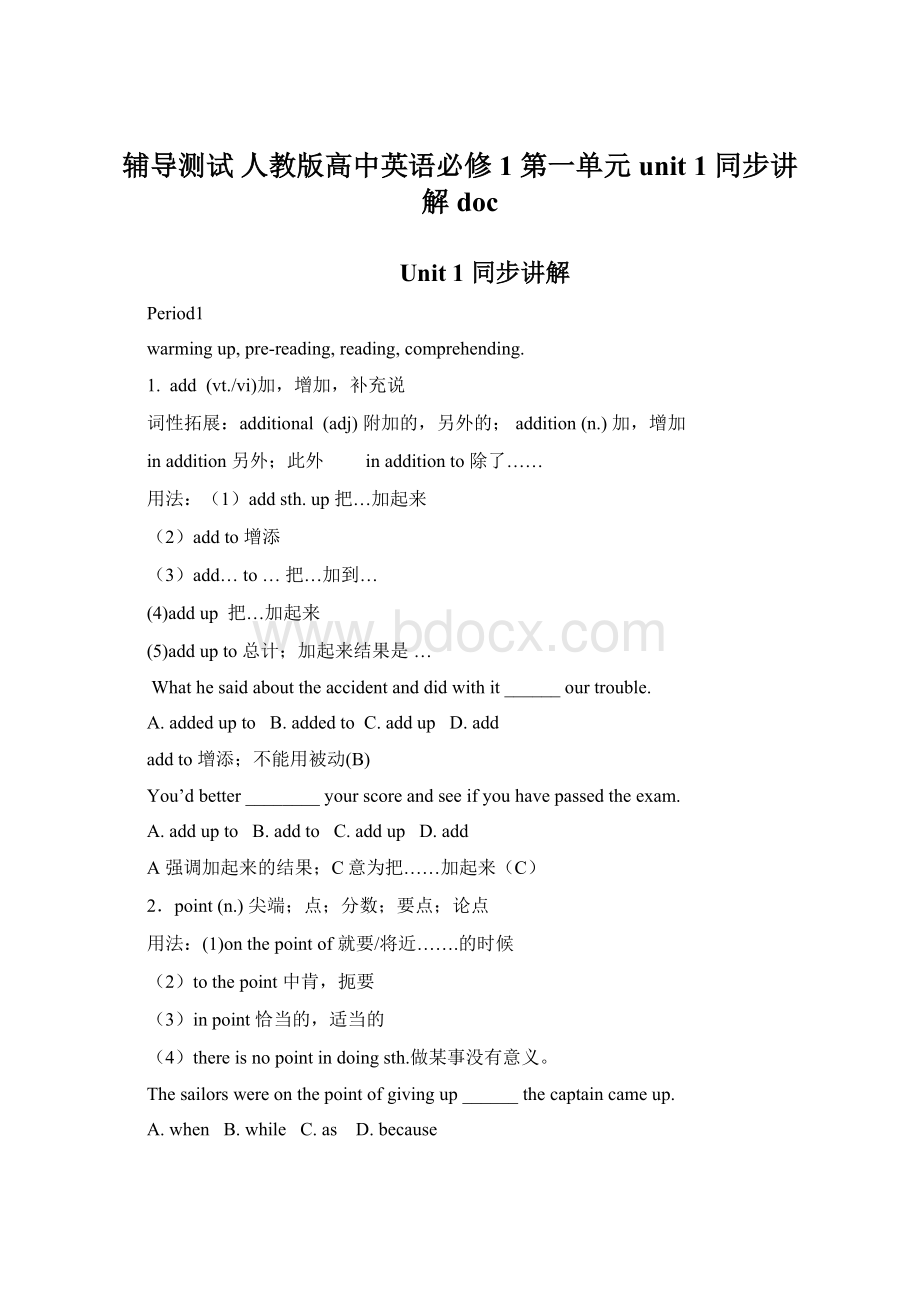辅导测试人教版高中英语必修1 第一单元 unit 1 同步讲解docWord文档下载推荐.docx
《辅导测试人教版高中英语必修1 第一单元 unit 1 同步讲解docWord文档下载推荐.docx》由会员分享,可在线阅读,更多相关《辅导测试人教版高中英语必修1 第一单元 unit 1 同步讲解docWord文档下载推荐.docx(21页珍藏版)》请在冰豆网上搜索。

B.while
C.as
D.because
Beonthepointofdoing…when…是固定句式。
When在此处表示“在那个时候”=andatthattime此时不能用其他词(as/while)代替。
拓展:
句型
(1)beabouttodo……when……
(2)bedoing……when……
(3)have/haddone…….when……
3.
ignore(vt.)不理睬;
忽视
ignorant
adj.
无知的;
不知的
ignorance
n.
无知;
愚昧
(1)ignoresb./sth.忽视某人/某物
(2)beignorantofsth
he________thedoctor’sadviceandgoesonsmoking.
Iwas________ofthefactthatthebosscouldbesostrict.
(ignores;
ignorant)
4.clam
平静的;
镇静的;
沉静的
youshouldkeepclamintimeofdanger.
区别:
silent不说话,不出声;
quite安静的;
宁静的;
still不动的;
强调“静止状态”;
clam
指人“沉着,镇定”;
指自然“无风无浪”。
(1)
Theoldmanstoodquite_______,exceptthathislipsmovedslightly.
(2)
Onemanshoutedattheboy,“be_______,boy!
what’sthematterwithyou?
”
(3)
Heis_______abouttheaccident.
(4)
Heremained_________inthefaceofthecruelenemy.
(1.
still2.quite.3.silent.4.calm)
5.concern
vt.涉及;
关系到
n.关心;
关注
用法拓展:
(1)beconcernedabout/forsth.关心挂念……
(2)beconcernedinsth.和某事有牵连
(3)beconcernedwithsth.与某事有关/关于…….
(4)asconcerns
关于(=concerning)
(5)asfaras…beconcerned…就……而言
(6)show/feelconcernfor/about……担心/关心……
Themeetingwasconcerned_________reformsandeveryonepresentwasconcerned_______theirowninterests.
A.with;
for
B.with;
with
C.for;
about;
D.about;
with
(前一句理解为“会议与改革有关”,因此此处应填介词with;
后一句句意为“到会的每一个人都关心自己的利益”,因此空二填介词about/for。
A)
6.loose
adj.松的,松散的,松开的
loosen
vt./vi.
解开,放松;
变松;
用法拓展;
breakloose
挣脱出来;
迸发出来
come(get)loose(结等)松掉;
let/setloose释放;
放出;
发出
7.cheatn.欺骗;
骗子
vt./vi.欺骗;
作弊
(1)cheatsb.intodoingsth..欺骗某人做某事
(2)cheatsb.(out)ofsth.欺骗某人某物
(3)cheatsb.intothebeliefthat…骗某人相信…
cheatintheexam考试作弊
8.reason
n.理由;
原因
vt./vi.推理;
说服
e.g.:
Myreasonisthatthecostwillbetoohigh.我的理由是费用太高。
reasonable
adj.合情合理的
(1)forthis/that/no/somereason因为这个/那个/没有/某一理由
(2)reasonwithsb.和某人辩论
(3)byreasonof因为,由于……
(4)thereasonforsth./doingsth.isthat…….做某事的理由是…….
(5)
Thereasonwhy……isthat……做某事的理由是……
Thereason_________hewaslatewas______hiscarhadbrokendownontheway.
A.why;
because
B.that;
C.that;
D.why;
that
Shewouldliketoknowthereason________fewerandfewerstudentsareshowinginterestinherlesson.
A.for
B.why
C.forthat
D.which
Whatdoyouthinkofthereason________heexplainedinhislastletter________refusingthejob?
why
B.that;
forwhich
C.which;
D.that;
because
(D.
B.首先分析定语从句结构,主谓齐全,空格只能填状语成分,所以使用关系副词why;
C改为forwhich也对;
C.注意:
reason
后面的定语从句不一定用why引导,要看在定语从句中缺少什么句子成分。
在这里explain缺少宾语只能用关系代词that或which
引导。
补充:
reason与cause的区别
指在事实的基础上通过逻辑判断出的理由与conclusion(结论)相对,常与for或why连用;
cause是自然造成某种结果的原因,与effect(结果)相对,常与of连用。
用reason,cause填空
The________ofthefireisstillnotknown.
Givemeyour________fordoingit.
9.list
vt.
列出
n.表,一览表,目录,名单
makealistof……列……表
10.Share
vt./vi.分享;
共同使用
一份;
份额
(1)share(in)sth.分享/分担某物
sharesth.withsb.与某人共享某物;
与某人分担某物
11.Feeling
感觉;
感情
feel
vt./vi.感觉,感受,触摸
feelings情感
12.Netherlands
n.荷兰
Netherlander
n.荷兰人
Netherlandish
adj.荷兰的;
荷兰人的;
荷兰语的
n.荷兰语
13.German
n.德国人;
德语
adj.德国的;
德国人的;
德语的
Germany
n.德国
German的复数形式是Germans,而英国人、法国人的复数形式是Englishmen和Frenchmen.
14.series
n.连续;
系列
Therewillbeaseriesoffootballgamesnextmonth.
aseriesofmeeting/exams/textbooks
twoseriesofstamps
series单复数同型,作主语时谓语动词根据series单复数概念决定,不根据of的名词决定。
15.Outdoors
adv.在户外;
在野外;
Childrenusuallypreferplayingoutdoors.
相关拓展:
outdoors
adj.户外的,野外的
indoors
adv.在室内;
入室内
indoor
室内的
16.Crazy
adj.疯狂的;
狂热的
(1)becrazyabout…….对……狂热,痴迷
(2)becrazyforsb./sth.=longfor渴望某物或迷恋某人
becrazywith因……而发疯
HehasgreatlyimprovedisspokenEnglishbylearningCrazyEnglish.
Andhe________achancetogoabroad.
A.iscrazyabout
B.iscrazyfor
C.ishopingfor
D.hopesabout
17.nature
自然;
自然界
keepthebalanceofnature
natural
自然的;
naturally
adv.
自然的
againstnature
违反自然
bynature
生来;
天生
innature
性质上;
inthenatureof
具备……的性质
注意:
nature意思是“自然,自然界”,前面不加冠词。
18.purpose
目的;
意图
Thepurposeofthebookistoprovideacompleteguidetotheuniversity.
(1)onpurpose故意地=withthepurposeofdoing
(2)forthepurposeofdoing为了……的目的
Heheldouthisfistbeforetheyoungmanandtriedtoangerhim________.
A.forpurpose
B.onpurpose
C.inpurpose
D.frompurpose
(B)
★19.dare
vt./vi.
Aux.敢;
胆敢
(1)dare作情态动词,一般用在否定句、疑问句和条件状语从句中,后跟不带to的不定式,有自己的过去式dared,无人称和数的变化。
Hedarednotgonearthedog.
Ifyoudarespeaktomelikethatagain,you’llbesorry.
(2)dare用作实义动词,后跟带to的不定式,有人称、数及时态的变化。
但在否定句和疑问句中可省略to.
Doyoudare(to)jumpoffthehighwall?
Shedoesn’tdare(to)sayanything?
做题时,应先判断dare是情态动词还是实义动词。
He________hisparentsabouthisfailureintheexamination.
A.darenottell
B.daresnottotell
C.darenottotell
D.darenottell
Iwonderedhowhe_________thattotheteacher.
A.daretosay
B.daresaying
C.notdaresay
D.daredsay
(D,本题考察dare的用法。
A\B\C三项从darenot判断显然是情态动词,后应跟动词原形,排除B\C二项。
A项dare是情态动词,无人称和数的变化,不应加“s”,故答案选D.)
(D.本题考察dare的用法。
Dare用作行为动词有人称、数和时态的变化。
A项从tosay来看,dare是实义动词,有时态的变化,应把dare改为dared。
用作情态没有人称和数的变化,但有时态变化,其后接省to的不定式,但不能接动名词,排除B。
C没有这种形式,故答案选D.本句中daredsay(情态动词)=daredtosay(实义动词)
20.Thunder
n.雷;
雷声vi.打雷;
雷鸣
thunder-storm
n.雷暴;
雷雨
thunder-shower
n.雷阵雨
21.Entirely
adv.完全地;
全然地,整个地
Iagreewithyouentirely.
entire是形容词,意为“整个的,全部的”(=whole);
全然的,完全的(=complete);
(构成一组的东西)全部齐全的,未破坏的;
无伤的,entire通常置于名词前做定语。
entirely用在否定句中,表示部分否定。
单句改错:
hisworkwasnotentiresatisfactory.
(entire—entirely,
副词修饰形容词,表部分否定。
句意为“他的工作并非完全令人满意”。
22.Power
能力;
力量;
权力)
Thepolicehavethepowertodetainoffenders.
powerful
强有利的;
强大的
powerless
adj.无力量的;
软弱的
powerfullyadv.强大地
(1)havethepowertodo有权利做某事
(2)brainpower智力
politicalpower政权
electric/waterpower
电/水力
powerstation发电站
comeintopower
掌权(动作);
beinpower掌权(状态)
区分:
power
力量;
电力;
权力
strength
力气
energy精力;
能量
Fullof________,heliftedthestone.
Fullof_________,heisalwaysactive.
Hitlercameinto_________inGermanyin1933.
Wehavethe________toobtainourshares.
(strength;
energy;
power;
power)
23.according
adv.依照
You’vebeeninprisonsixtimesaccordingtoourrecords.
accord
vt./vi.(使符合,一致)
accordant
一致的,调和的(with);
accordingly
按照;
依据
accordingto按照;
根据……所说
后面接名词、代词或what从句,用作状语。
________whatshesaid,thepolicequicklyfoundthethiefandcaughthim.
A.According
B.Accordingly
C.Accordingto
D.Accordto
(C)
24.trust
vt./n.
信任;
信赖
Don’taskme;
trustyourownjudgment.
(1)trustsb.=believeinsb.信任某人
(2)trustsb.todo(放心)托付某人做某事。
(3)sb.trustthat……相信……
词组:
1.
Makethefollowingsurvey做如下调查
Ofthefivehundredhouseholders_________,40%haddishwashers.
A.tosurvey
B.surveyed
C.surveying
D.beingsurveyed
Theteachercamein,__________somestudents.
A.follow
B.following
C.followed
D.tofollow
(B,表动宾关系,必须用被动关系,而且是完成被动。
B,考察非谓语动词。
Follow后面带着宾语,因此用现在分词作伴随状语。
而不定式作状语表目的和结果。
)
2.
Not……until……★
Hedidn’tgotobeduntilhismothercameback.
(1)本句型中主句谓语动词为瞬间动词,非延续。
(2)当notuntil放在句首时,主句用倒装语序,从句不倒装。
(3)在强调句中一般用notuntil短语或从句。
(
1)遇到itis(was)……that……
先判断是否是强调句,判断的标准是把itis(was)……that……去掉看句子仍然成立。
(2)not……until……
短语用在强调句型中必须合在一起。
Itwas_______lastweekthatwe________him.
A.until;
knew
B.until;
didn’tknow
C.notuntil;
knew
D.notuntil;
didn’tknow
(C.本句为一强调句型,强调not…until短语。
Not…until用于此句型中,必须放在一起。
另外,强调句的结构为:
itis(was)+强调成分+that…)
完成句子直到她摘下墨镜来,我才意识到她是个著名的电影明星。
Notuntilshetookoffhersun-glasses______I_______thatshewasafamousfilmstar.
(did;
realize
notuntil放在句首时,用倒装语序,主句倒装而从句不倒装)
3.
Getitrepaired让别人修理……
Myradiowasbroken,andImustgetitrepaired.
getsth.done
使某物被做;
havesth.done让别人做某事
★get之后可接复合宾语,即get+宾语+宾补,宾补可以是现在分词、过去分词或不定式短语,结构为:
{get+○+doing使……(主动)};
{get+○+done使……被……};
{get+○+todo使……做……}get+现在分词表示主动关系;
get+过去分词表示被动关系。
用所给动词的适当形式填空
Letmetrynow.
I’llgetthecar________(go)
Whenareyougoingtogetyourbike________(repair)?
I’llgethim________(do)thework.
(going
使汽车发动起来;
repaired表被动;
todo主动,表将来)
Theworkersget________bythehour.
A.paid
B.pay
C.paying
D.topay
(A,getpaidbythehour按小时付给工资。
Get+过去分词表示被动关系)
4.
havegotto必须,不得不
Hehasgottofinishhishomeworktoday.
haveto必须,不得不=havegotto
(客观)//must必